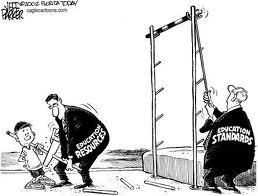Why Common Core Standards Will Succeed
Even though there is little evidence that state standards have increased student academic achievement since the 1980s, the District of Columbia and 45 states have embraced the Common Core–(see here and here).
Even though there is little evidence that countries with national standards do not necessarily score higher on international tests than nations without national standards, many states have already aligned their standards to textbooks, lessons, and tests– (see here and here).
Even though there is little evidence Common Core standards will produce the skilled and knowledgeable graduates that employers and college teachers have demanded of public schools, most state and federal officials have assured parents and taxpayers that the new standards and tests will do exactly that–(seehere and here).
Even though there is little evidence that state and national officials have resolved tough issues in the past when it came to curriculum standards (e.g., supplying professional development for teachers and principals, appropriate instructional materials, determining whether teachers altered their practices) much less reduce the inevitable problems that will occur in implementing the Common Core standards (e.g., resources for computer-based testing), cheerleaders continue to beat the drums for national standards–(see here andhere)
With all of these “even though”s (and there are more), Common Core standards


